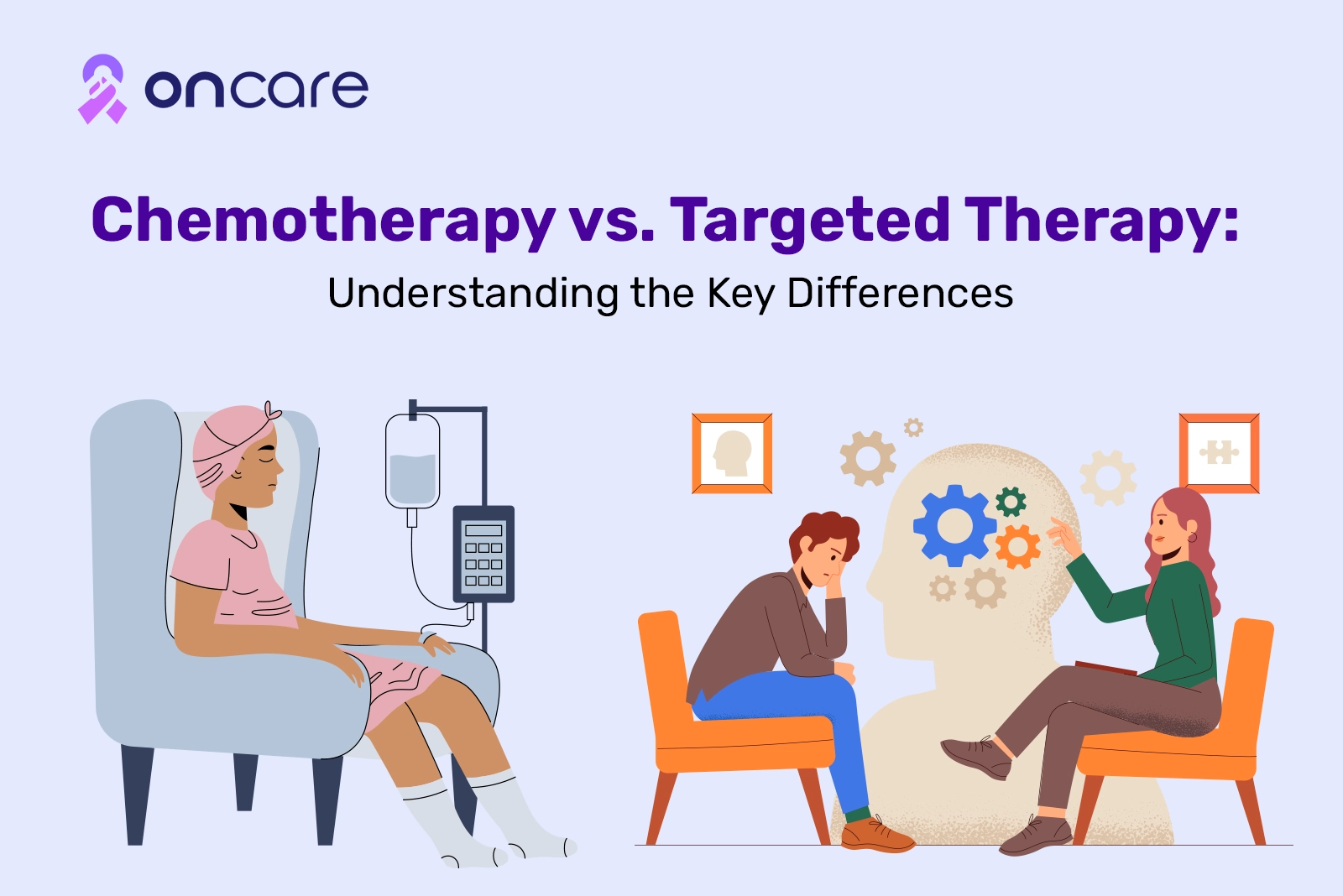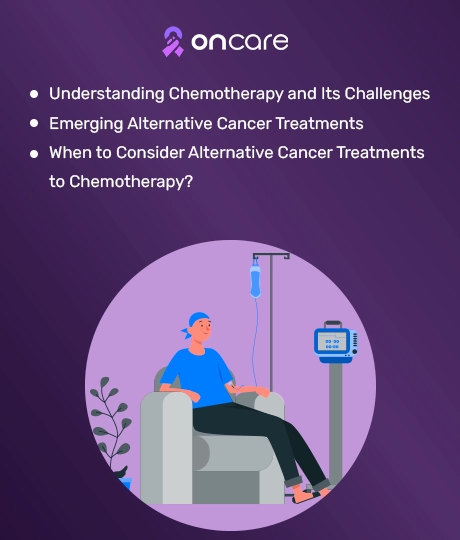Chemotherapy vs. Targeted Therapy: Understanding the Key Differences

Every year, millions of people bravely face the journey that no one chooses: cancer. However, patients now have more ways to fight back with the emergence of advanced treatments like chemotherapy and targeted therapy. Each of them comes with its unique advantages, difficulties, and inspirational tales. At Oncare, we offer a wide range of futuristic cancer treatments, including targeted therapy and chemotherapy. With a team of experienced oncologists and state-of-the-art facilities, we ensure cancer patients beat the disease effectively and live a healthy and happy life.
So, today, in this article, we will help patients understand these two popular cancer therapies. From their primary objectives to their long-term effects, we will explore the significant distinctions between these two treatments.
Key Differences of Chemotherapy vs. Targeted Therapy
Regardless of whether you have been recently diagnosed with cancer or already have been fighting against the disease and are thinking of switching to some effective alternative treatments, knowing about chemotherapy and targeted therapy is crucial. Our expert team of oncologists at Oncare helps patients navigate the differences between these treatments and helps them choose the right one aligned with their diagnosis and biology.
Core Objectives
Chemotherapy is a systemic medication used to destroy cancer's hallmark rapidly proliferating cells. But because it doesn't discriminate between good and cancerous cells, it affects a wide range of organs, including the digestive tract, bone marrow, and hair follicles. Its main objectives are to reduce tumor size, stop metastases, or get rid of cancer cells that remain after surgery.
On the other hand, targeted therapy concentrates on particular chemical changes that fuel the spread of cancer. These medications stop signals that let tumors grow, avoid detection by the immune system, or develop blood vessels. Trastuzumab, for instance, targets HER2-positive breast cancer cells while avoiding harm to healthy organs.
Impact on Tumor Microenvironment
Blood arteries, immune cells, and other tissues that influence the progression of cancer are found in the vicinity of a tumor.
Chemotherapy damages healthy cells as well as cancer, affecting the entire area. This may impair the body's natural defenses against cancer.
The action of targeted therapy is more accurate. By blocking proteins that aid in the growth of blood vessels in tumors, medications such as bevacizumab starve the cancer without endangering healthy tissue in the vicinity.
Diagnostic Requirements
Basic tests are necessary for chemotherapy in order to confirm the type and stage of the cancer (e.g., breast cancer stage II). Here, there is no need for specialized genetic testing.
To find certain markers, such as EGFR gene alterations in lung cancer or HER2 proteins in breast cancer, targeted therapy requires thorough testing. Our expert team at Oncare performs the necessary tests using advanced diagnostic technologies to help assess the possibility for targeted therapy.
Patient Selection
Since chemotherapy can be used to treat a wide range of cancer kinds and stages, many patients choose it as their first line of treatment. However, not every patient can handle its side effects because of its broad-spectrum toxicity.
On the other hand, not all cancer types respond well to targeted therapy. Only patients whose tumors display particular genetic markers can go through it. This personalized approach makes it highly effective for selected cases but limits its universal applicability.
Mechanisms of Action
Drugs used in chemotherapy prevent cells from dividing. Antimetabolites interfere with RNA and DNA synthesis, while alkylating chemicals primarily produce damage to DNA. These various processes, however, do explain the many side effects, such as nausea and anemia.
Drugs used in targeted therapy function by obstructing substances unique to cancer. For example, kinase inhibitors disrupt intracellular signaling, whereas monoclonal antibodies attach to surface proteins. An approach to treatment that is more targeted and possibly less harmful results from this specificity.
Mode of Drug Delivery
Chemotherapy is usually administered in cycles, either intravenously or orally, allowing the body to regroup between doses, with schedules varying on cancer stage and type.
Targeted treatment can also be administered orally or intravenously, however, it is often taken constantly rather than in cycles due to its target-cell strategy. This systematic method promotes the long-term inhibition of cancer cell proliferation.
Speed & Sustainability of Response
Chemotherapy is usually a fast process that works by shrinking tumors quickly. However, such an effect may be short-lived and needs many cycles as well as combination treatments to sustain remission.
Targeted therapy works a bit more slowly; it usually inhibits the growth and division of cancer cells gradually. Although it may not provide the initial shrinkage at first, it may be capable of sustaining for a longer duration, especially in combination with immunotherapy or other combination regimens.
Applications & Use Cases
Chemotherapy continues to be the first-line treatment for many aggressive cancers, including leukemia, lymphomas, and advanced-stage solid tumors. It is also considered to be employed often in adjuvant and neoadjuvant settings to reduce tumor burden.
Because targeted therapy has become integrated into the treatment paradigm of these cancers, it is used mainly when we know which type of genetic alteration is driving the cancer, such as HER2-positive breast cancer, EGFR-mutated lung cancer, or BRAF-mutated melanoma. In this case, targeted therapy might become the primary treatment, perhaps alongside conventional methods.
In some cases, our oncologists combine both approaches—using chemotherapy to debulk tumors and targeted drugs to mop up residual cells.
Efficacy & Side Effects
On one hand, chemotherapy is beneficial with its quick results, but on the other hand, it has curable side effects including neuropathy, mild stomach problems, temporary cognitive difficulties sometimes referred to as 'chemo brain', and increased risk of infection. However, these side effects are only temporary and will subside with time and proper post-therapy care.
Even if targeted therapy is generally associated with fewer side effects, it is still prone to minor risks. Some common problems include skin rashes and diarrhea. However, the specific concerns depend on the drug, so if you are getting affected by a particular drug, your oncologist will change your prescriptions accordingly that suit your body. Nevertheless, in targeted therapy, positive results have always prevailed against the negative ones with a huge efficacious patience response.
Our oncologists at Oncare help you manage and subside the possible side effects by regulating the dosage and prescribing a suitable antihistamine so that you can receive the maximum effective results.
Cost & Accessibility
Chemotherapy is more affordable and widely available, with well-established regimens in nearly every cancer center. However, the necessity for ongoing treatment and supporting care might result in significant cumulative expenses.
Targeted treatment is usually more expensive since it involves specialized medications and molecular diagnostics. However, its superior effectiveness and lesser toxicity frequently justify the cost for qualified patients.
At Oncare, we help patients navigate financial alternatives and insurance coverage regardless of whichever therapy you choose, making cancer treaments more accessible.
Post-Therapy Results
Chemotherapy frequently necessitates ongoing treatment and thorough monitoring due to the potential for recurrence and resistance. Long-term consequences, such as organ damage and subsequent cancers, must also be considered.
The targeted treatment provides a more prolonged response, particularly in tumors that have strong molecular targets. However, resistance remains a concern, necessitating continuous innovation and combination treatment techniques.
At Oncare, we constantly analyze patient reactions to adapt follow-up care and get the best possible results in both chemotherapy and targeted therapy.

Conclusion
Although chemotherapy and targeted therapy both have a significant impact on cancer treatment, chemotherapy is more or less the long-standing option for quite a number of cases, while targeted therapy is a relatively newer alternative that has more accuracy and fewer side effects on some chosen individuals.
At Oncare, we give professional advice and personalized treatment plans that incorporate the most recent advances in chemotherapy and targeted therapy. Our objective is to provide every cancer patient with the most effective and compassionate treatment possible. For scheduling a consultation and finding out the most suitable treatment for you, visit us today.